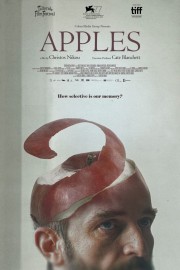Apples
If we took the time and resources to really address issues of mental health issues in America, I imagine something like the scenario that plays out in “Apples” might be the rule, rather than the exception. This lovely film should create anxiety in me, with its bleak premise, but instead, I feel hopeful for how humanity can persevere over challenges we face. This might be a film I take to heart, because truthfully, that’s where it belongs.
Of course, co-writer/director Christos Nikou did not necessarily realize a real-life pandemic was on the way when he made “Apples,” but seeing it after two years of pandemic times makes you appreciate how well filmmakers are able to capture what that feels like. There was a film at Sundance in 2021 called “The Pink Cloud” that felt very similar in how effective it was in exploring the emotions we were going through in 2020. This is the type of thing that makes Roger Ebert’s assessment of movies as “empathy machines” accurate. In “Apples,” Nikou doesn’t create a pandemic that requires its characters to isolate from others; quite the opposite, the goal is to get people to connect again, with life, and with each other. That’s part of why I love this film.
Aris (Aris Servetalis) is on the bus when it reaches the end of its route. The problem is, he doesn’t know where he was going, or who he is. We don’t see him hit on the head, or suffer and injury. It turns out, there is an epidemic of amnesia going around. Aris is taken to a facility to help him adjust, maybe wait to see if any family comes to collect him. No family comes- we do not know whether it’s because he doesn’t have any, or- maybe- they have come down with this amnesia as well. But Aris is alone, and having to learn to live again. The doctors start him on a process of re-education so that he can get back to a normal life. Always taking a Polaroid camera with him, he is to document his experiences, some of which are suggested to him on audio cassettes his case workers give him.
Aris’s experiences include riding a kid’s bike, going to a bar and dancing, going to a movie, and driving a car, and getting in an accident. We don’t know how many of these experiences- like the bike and car- he’s been taught to do anew, or how many are muscle memories that are coming back as he witnesses other people do them. One memory that does seem to survive is a predilection towards apples, which gives him some sense of normalcy. These scenes have an wonderful humanity to them- Nikou gives us a chance to seem like we’re experiencing these things with him. Naturally, I think watching a movie is my favorite part, because Aris transitions from watching the film itself to watching a woman watch it. The woman in question, Anna (Sofia Georgovassili), is like Aris, and the two strike up a connection. Where it leads, and what it reveals, is not necessarily what you expect, but it gives Aris an opportunity to connect with another human being, and they make a lovely match.
The human mind is one of the most complicated things known to man. Even when we forget a lot of things, there are other things that will live on in our memories. There are times I’ve noticed this in the most unusual ways with my mom as she’s struggled with dementia over the past few years. At the same time, I am wondering about what the future has in store for me when it comes to my own memory. Was his love of apples spared to give him something to latch on to, a key to unlocking what the rest of his life might have been like? Even at the end, we aren’t quite sure of all of the answers, but he seems to have found peace of mind in that final scene. Once that is found, nothing else that happens to us matters, and we just want what gives us happiness, even if that means taking a bite of an apple.










